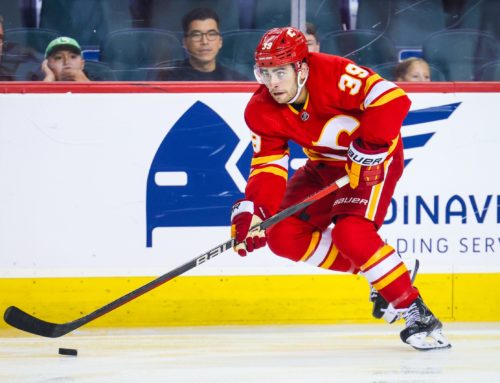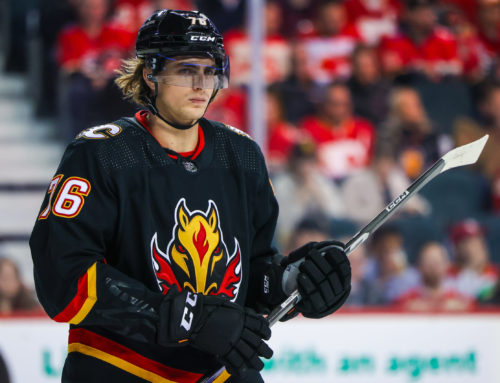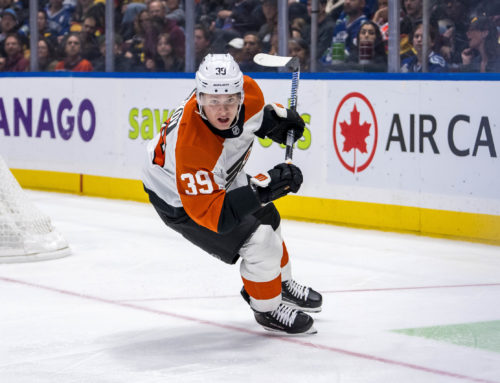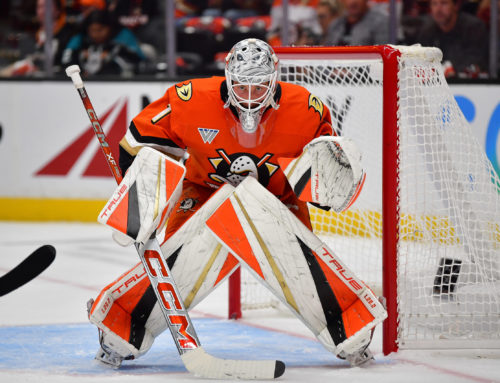When I think back to when Vincent Trocheck first started to catch my attention, I can't help but reminisce about the 2016 World Cup of Hockey tournament. To me, this event was a coming-out party for many of the young up-and-coming stars in this league. The tournament was formatted to do exactly that by including Team North America, which featured any North American players who were 23 and under. You had the likes of Connor McDavid, Auston Matthews, Jack Eichel, and on and on. It was truly a who's who of the future of the NHL. Trocheck made that team after experiencing a breakout season the year prior. In the tournament he scored a goal in three games and he really looked like he belonged amongst the league's elite. But to figure out how we got here, we need to go back to how it all started.
Trocheck was selected in the third round, 64th overall, all the way back in the 2011 NHL Entry Draft by the Florida Panthers. He was praised for his high-end hockey IQ and silky-smooth hands, which allowed him to perform as a high-level playmaker and also be a reliable two-way center. Trocheck was never really touted as an elite offensive scorer. The season leading up to his draft, he began to show signs of a major breakthrough as he notched 29 goals and added 56 helpers which was good for an 85-point season for the Saginaw Spirit of the OHL.
2012-13 would mark the last year Trocheck's last year playing junior, and he went out with a bang. Between stints in Saginaw and Plymouth, he accumulated 50 goals and 59 assists for a whopping 109-point season in just 63 games. This was enough to lead the OHL in points and is dangerously close to a 2 points-per-game average. All signs started to point towards Trocheck developing into a big-time NHL prospect.
In 2013-14, Trocheck was off to San Antonio to join the Rampage to officially start his pro career. He was showing some moderate success in his new home. Towards the end of the calendar year of 2013, Trocheck made the United States World Juniors team. Alongside fellow Panthers prospect Rocco Grimaldi, the two went on to capture gold for the United States after combining to score all three goals in a 3-1 win over Sweden in the finals.
After spending some more time with the Rampage following his World Juniors stint, the Panthers decided to call up Trocheck in March for the remainder of the season. Doing so would burn the first year of his entry-level contract. The Panthers were in full rebuild mode at this time, so Trocheck got a chance to play in some major minutes in his 20 games with the Panthers, averaging nearly 19 minutes a game. He was only able to put up eight points during his first run as a Panther, but it's worth noting the team was absolutely horrible at this point.
The following season was more of the same, as perhaps Trocheck was experiencing some growing pains in adapting to the NHL game. After starting out another season in San Antonio, Trocheck was called up in November. In 50 games of action, he only managed 22 points. While these numbers weren't great, it's important to look at the finer details. Unlike his first 20 games from the prior year, Trocheck averaged an even 14 minutes of ice time in 2014. He was mainly used as the Panthers third-line center, and on top of that he only saw 17.9% of all Panthers power play time, which is the lowest of his career.
The young nucleus of the Panthers was starting to pay dividends. Despite a 91-point effort in the 2014-15 campaign, Florida was left on the outside looking in come playoff time. Missing the postseason sure did sting, but the Panthers saw a 25-point improvement from the previous season and were definitely trending in the right direction.
2015-16 would mark a breakthrough season for both Trocheck and the entire Panthers team. Trocheck was promoted to a top-six role and became a steady producer as the team's second-line center. He found great chemistry centering a line between Jussi Jokinen and Reilly Smith. All three finished the season with 50 or more points. Trocheck saw his power-play usage go up as well as he managed 13 points on the man advantage. His average shots on goal per game was also trending upwards which is always a great sign. He even had some grit to his game, laying out 125 hits on the year.
At this point, Trocheck was starting to pop on the radars of many fantasy hockey league owners. His breakthrough season was rewarded, as Florida committed long-term by inking a six-year, $28.5 million dollar extension. This brings us back to the aforementioned World Cup of Hockey performance. Although Team North America came up a bit short, Trocheck had made his mark, and going into the 2016 season, he was poised to do big things.
Trocheck would put up a remarkably similar campaign in 2016 to his prior season. He would finish with 54 points which is a very respectable total, especially considering at this point he was still only 22 years old. At first glance, as a fantasy owner these point totals won't blow you away, and it can be hard to justify adding a sub-60-point center to your roster, but there were a lot of great takeaways from this season. For a second straight season, his average shot totals were up, coming in at 2.8 per game. His hits were up too, averaging two per game. And on top of all this, he was quietly beginning to develop his faceoff game. He won 50.1 percent of his draws which was a career best, and 826 in total, which is a very reliable total. So depending on what categories your fantasy league may use, Trocheck was beginning to check off multiple boxes.
That brings us to 2017-18, which was undeniably his best year as a pro. He reached career-bests in all offensive categories. He eclipsed the 70-point plateau by scoring 31 goals and adding 44 helpers which was good for 75 points in total. This season was an undeniable success, yet some may question how much of it can be attributed to playing with superstar Jonathan Huberdeau. Playing with elite players definitely doesn't hurt, but I attribute Trocheck's breakthroughs mostly to improvements in his own game, and more opportunities given to him to contribute. At this point, Trocheck was getting first unit power play minutes, and he surely was making the most of them as 27 of his 75 points were on the man advantage.
By this point, Trocheck had become a must-own for all fantasy players in all formats. He was doing it all and was showing no signs of slowing down. Unfortunately, the "Hockey Gods" had other plans.
November 19, 2018 marked a potential turning-point for Trocheck. In a game versus the Ottawa Senators, Trocheck chased down a loose puck in the end-boards and had an awkward, freakish collision with an Ottawa player. He fell backwards onto his own leg and severely fractured his ankle. After being stretchered off the ice, Trocheck would need surgery and would miss significant time. He would return after two full months on the shelf, but his play wasn't quite the same after the unfortunate injury. While he was still shooting an average of just under three shots per game, his shooting percentage had plummeted to just 6.3% which was the worst in his career.
Unfortunately 2019-20 provided more of the same and the Panthers started shuffling Trocheck around with new linemates often in an attempt to get him going offensively again. Surprisingly the Panthers opted to trade Trocheck ahead of the trade deadline to the Carolina Hurricanes. It surprised me the Panthers were so quick to deal away a player who is the prime of their career, not to mention is on a fairly reasonable contract. Maybe they thought Trocheck wouldn't ever bounce back from his ankle injury and become the player he once was back in 2018?
Last season turned out to be a write-off in many ways anyways thanks to COVID-19 derailing the season. The Hurricanes went on to beat the Rangers in the qualifying round of the playoffs, but then lost in five to the Bruins. Trocheck never really found his footing in the bubble and only chipped in two assists in eight games.
That brings us to the present day. It's another weird, COVID-twisted season which features teams only playing against their divisional opponents. It's weird, but there's still lots of analysis to pull from the games being played. Trocheck has finally seemed to settle in with his new team. In 22 games played he has 12 goals and nine assists for 21 points, just a tick under a point-per-game pace. After trending downwards in ice time and power-play time in the year prior, he is back to having an average time-on-ice of 18:48, and is also being featured on a lethal first-line power-play unit. His shooting percentage is currently 18.8% which quite frankly seems a little unsustainable, but aside from that, it seems Trocheck is starting to regain his old form.
If the season was 82 games, he would be on pace to hit 78 points which would be a career high. On top of that he is now amongst the league's elite in faceoffs this season, winning an absurdly high 56.8 percent of his draws. He continues to be a great two-way forward and plays the game hard on both sides of the ice. He is on pace to have about 60 blocked shots this season which would be a career best, and he is good for about 2 hits a game on average.
Trocheck currently is centering the second line between promising youngster Martin Necas and Swiss winger Nino Niederreiter. There could be some variation depending on where the Canes slot in Teuvo Teravainen who has been battling a concussion as of late. Should Teravainen end up on Trocheck's line in the future, it could yield some very nice offensive results, so that's something you should keep an eye on going forward. Regardless of who plays the wings, if Trocheck stays locked in as second-line center and continues to get top-unit power play time, he has the chance to be a difference maker for your fantasy team. At this point, Trocheck should be useful in just about any format for fantasy hockey and needs to be owned.






 VAN
VAN L.A
L.A CBJ
CBJ NYI
NYI PHI
PHI ANA
ANA CHI
CHI ARI
ARI
